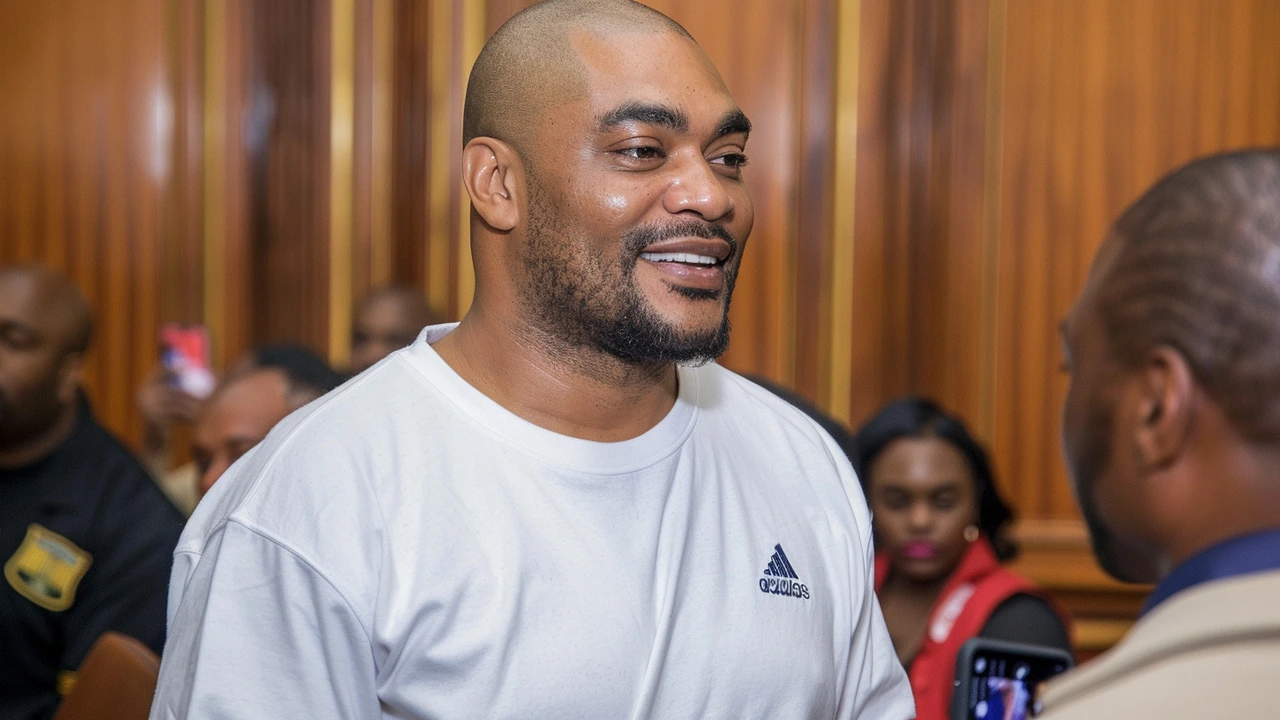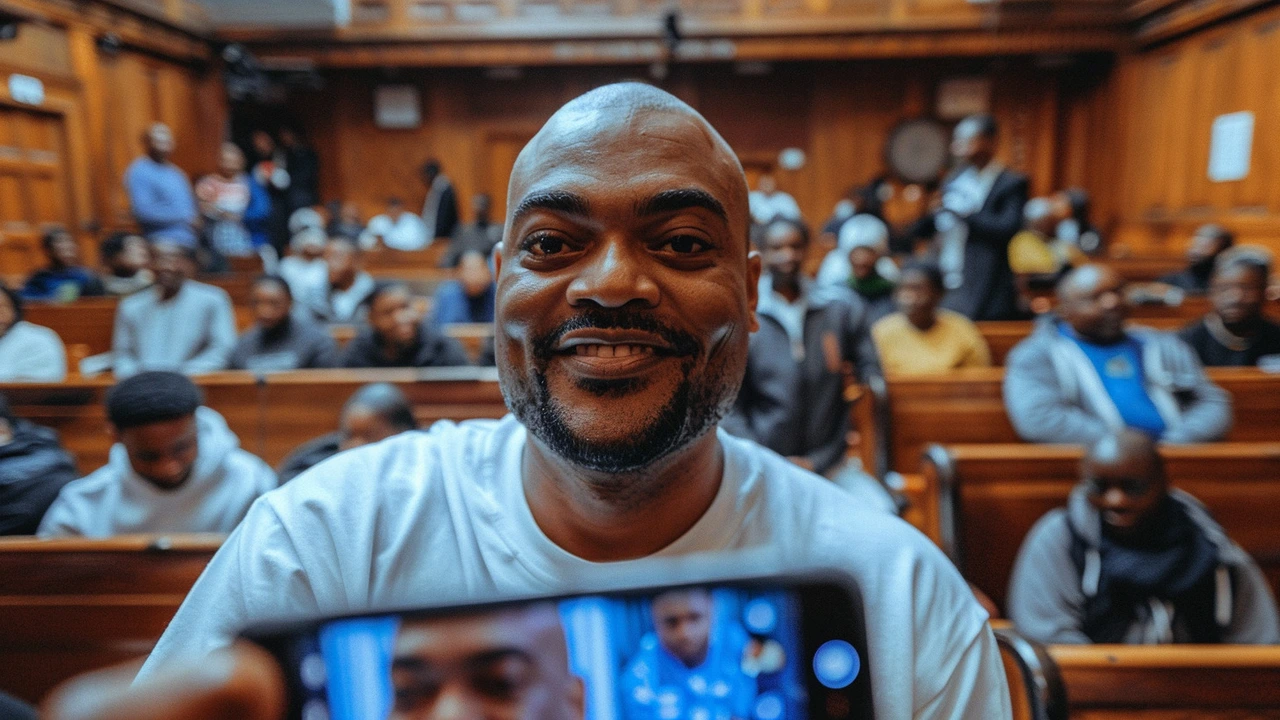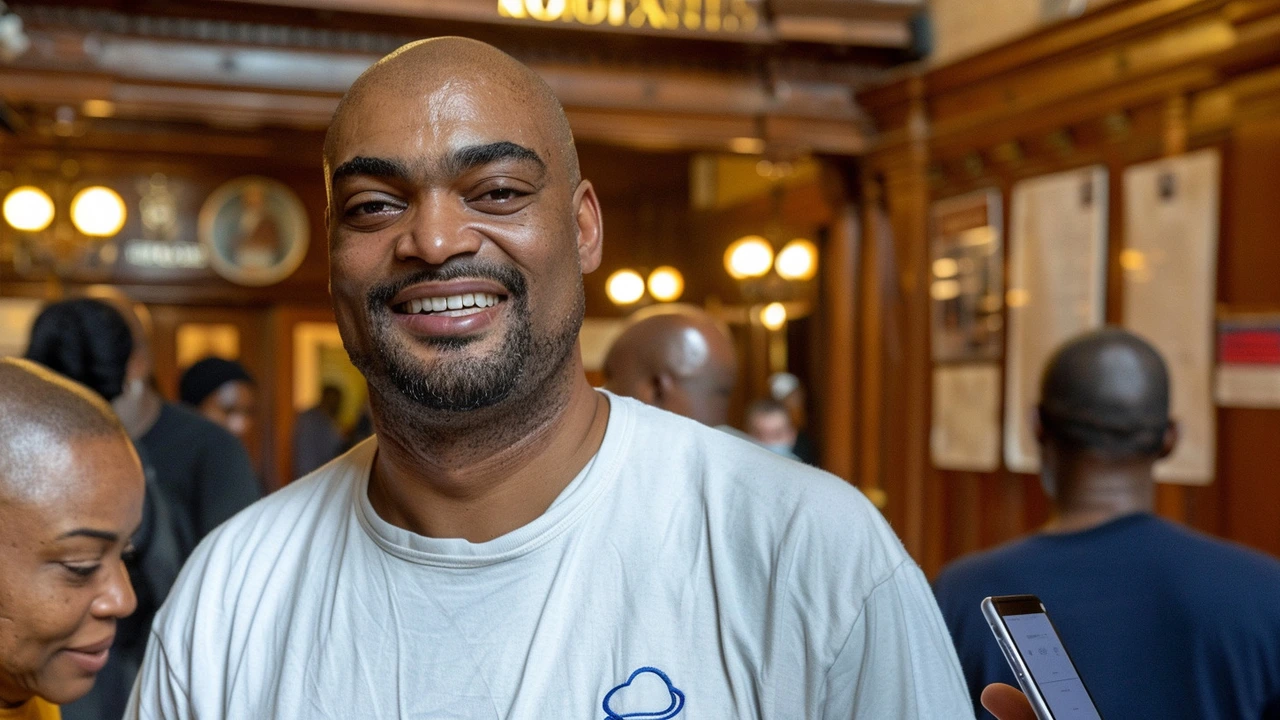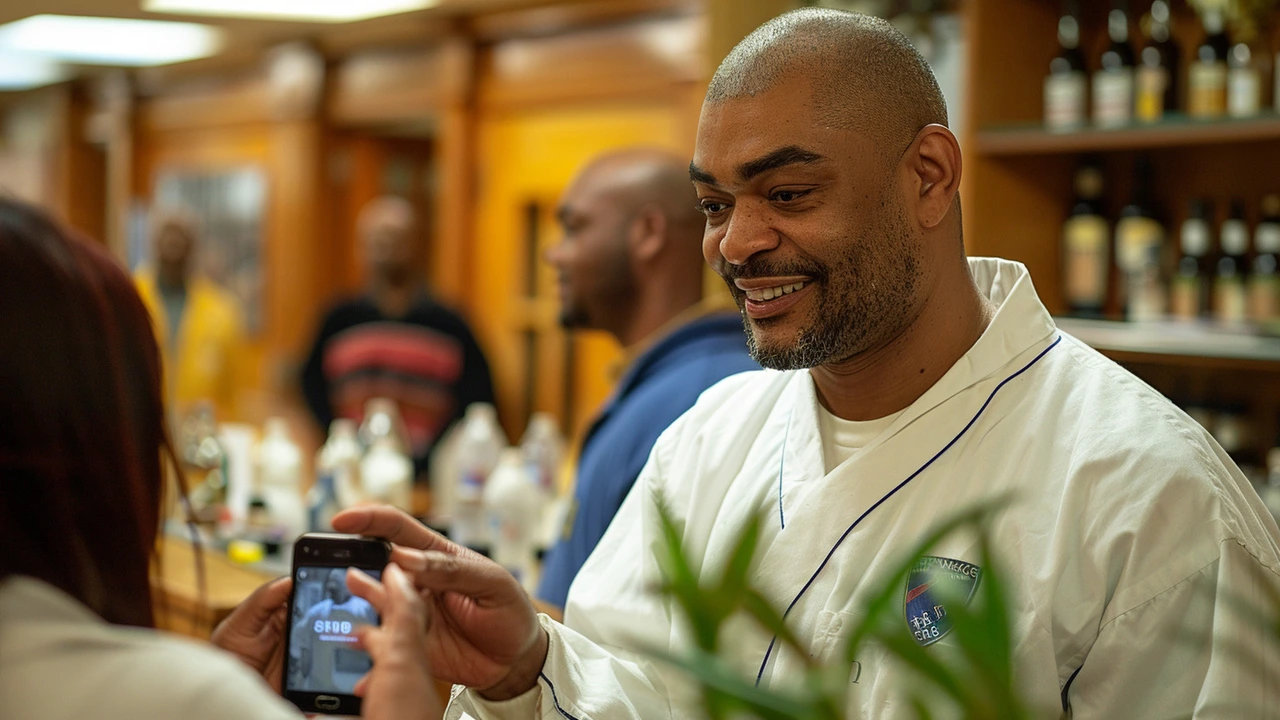Thabo Bester's Shocking Request for the Death Sentence
In an astonishing and emotionally charged courtroom episode, Thabo Bester, a convicted murderer, dramatically requested to be sentenced to death. The unexpected plea was made while Bester was on trial, a moment that left the judge, court officials, and spectators in a state of bewilderment. Bester, who has been the subject of intense public scrutiny, appeared visibly remorseful as he voiced his belief that he did not deserve to live.
The courtroom was heavy with tension as the prosecution presented its case, elucidating the heinous nature of Bester's crimes. It was during this time that Bester interrupted the proceedings, making a plea that caught everyone off guard. He admitted to his wrongdoings with a level of candidness that is rarely seen in such settings, and his request for the death sentence added a layer of complexity to the trial's outcome.
The Weight of Bester's Crimes
Bester's criminal history is marked by violence and cold-blooded actions that created an atmosphere of fear within the community. His offenses, which include multiple counts of murder, have left lasting scars on the victims' families and the broader society. The prosecution detailed these incidents meticulously, painting a vivid picture of a man who had shown little regard for human life.
As the prosecution methodically outlined the evidence against Bester, the weight of his crimes became increasingly apparent. Each piece of evidence further solidified the case against him, leading to a palpable sense of conviction in the courtroom. Bester's unexpected outburst and plea for the death sentence came at a moment when the narrative of his guilt was overwhelmingly clear.

A Courtroom Stunned
The judge, visibly taken aback by Bester's sudden request, paused to regain composure before continuing with the proceedings. Such a plea is highly unconventional, particularly in a legal system where the death penalty is a subject of contentious debate. The courtroom, filled with lawyers, journalists, and members of the public, fell silent as they processed Bester's words.
The judge addressed Bester with a measured tone, acknowledging the gravity of his request while underscoring the importance of following due process. The legal system, designed to ensure justice is served fairly and equitably, must consider Bester's plea against the backdrop of the facts presented in court. Despite the dramatic nature of the request, the judge emphasized that the trial would proceed methodically, taking all aspects into account before reaching a decision.
Public Reaction and Media Attention
Bester's trial has been a focal point for media coverage, capturing the public's imagination and sparking widespread debate about the nature of justice and punishment. The dramatic turn of events has only intensified interest in the case, with opinions split on whether Bester's request should be granted. While some argue that his plea is a reflection of genuine remorse, others view it as a strategic move to garner sympathy or avoid a life sentence.
The public reaction showcases the deep divide in societal attitudes towards capital punishment. On one side, there are those who believe that the ultimate penalty is the only fitting response to such egregious crimes, while others see it as an antiquated and morally problematic practice. This case has brought these debates to the forefront, forcing individuals to confront their own beliefs about crime, justice, and retribution.

The Legal Implications
The request for the death sentence raises significant legal questions. Jurisdictions with varying stances on capital punishment must navigate the complexities of Bester’s appeal. The court must consider whether his remorse and request are genuine or a calculated measure to influence the trial's outcome. Legal experts will likely scrutinize precedent cases to guide their decisions on this matter.
The prosecutorial team has not yet provided a formal response to Bester's plea. However, they maintain that justice must be served in line with legal provisions. Although public interest veers towards sensationalism, the law must remain impartial, meticulously evaluating each plea and piece of evidence before arriving at an appropriate verdict.
Moving Forward with the Trial
The court is expected to continue the sentencing process in the coming days, deliberating over both the severity of Bester's crimes and the unusual nature of his death sentence request. The judge and legal teams involved must weigh numerous factors, including public safety, legal precedents, and the principles of justice and rehabilitation.
Bester's trial likely has a long road ahead. The legal process is designed to ensure thorough examination and equitable judgment, free from external pressures or hasty conclusions. Both the defense and prosecution will continue to present their arguments, and additional testimonies might be heard before a final verdict is pronounced.

Conclusion
The case of Thabo Bester stands as a poignant example of the intricate balance between justice, law, and human emotion that characterize the legal system. His dramatic request for the death sentence has added a profound twist to an already high-profile trial, capturing the public eye and igniting debates about the death penalty and justice.
As the trial progresses, it will be crucial for the judicial system to maintain its integrity, adhering to the principles of fairness and thoroughness. Whatever the final outcome, this case will likely leave an indelible mark on public discourse surrounding crime and punishment, encouraging deeper reflection on the true nature of justice.

Sienna Ficken
June 6, 2024 AT 20:11Oh wow, a murderer begging for the ultimate punishment – talk about a plot twist you didn’t see coming. It’s almost poetic, except the poetry is drenched in blood and courtroom drama. Honestly, the guy probably thinks a death row cell is a spa retreat after all the chaos he caused. Still, the legal system has to treat this like any other plea, no matter how theatrical.
Zac Death
June 9, 2024 AT 12:11Okay, let’s break this down, because there’s a lot to chew on. First, the sheer audacity of a convicted murderer voluntarily swinging the guillotine at himself is a rarity in modern jurisprudence, and it forces us to re‑examine the very purpose of punitive sentencing. Second, the judge’s stunned silence is hardly just a reaction to the drama; it’s a signal that the court must now balance genuine remorse against the procedural safeguards that protect everyone, even the condemned. Third, the public’s split reaction highlights how polarized our society is on capital punishment, and it serves as a reminder that media coverage can sometimes amplify the sensational over the substantive.
Fourth, we need to consider whether Bester’s request is an act of contrition or a strategic move to avoid a life sentence, which would give him a sliver of hope for parole. Fifth, the prosecutor’s silence on the matter may be tactical, waiting to see how the defense frames the plea. Sixth, the legal precedent in our jurisdiction historically leans away from forced capital sentences, making this a potential landmark case. Seventh, the defense might argue that the request undermines the principle of autonomy because it’s made under extreme stress. Eighth, the victims’ families are caught in a feedback loop of grief and anger, which could sway public opinion toward retributive justice. Ninth, the psychology behind a murderer asking for death is complex, involving possible guilt, shame, or even a desire for control over his fate. Tenth, imagine the future appeals process if the court accepts the plea – would higher courts feel compelled to overturn it on grounds of public policy? Eleventh, the media’s framing of Bester as either a tragic figure or a manipulative villain will shape the narrative for months. Twelfth, the court’s eventual decision could set a precedent for how voluntary death‑sentence requests are handled elsewhere. Thirteenth, the outcry from anti‑death‑penalty activists will likely increase, sparking protests and petitions. Fourteenth, the legal community will dissect this case in law reviews, debating the ethical implications for decades. Fifteenth, at the end of the day, the judiciary must remain impartial, ensuring that even the most dramatic pleas are judged on law, not on theatrics.
Lizzie Fournier
June 12, 2024 AT 04:11Honestly, these courtroom dramas can feel like reality TV, but the stakes are real lives. It’s important to keep empathy in the conversation, especially for the families who have already suffered so much. Bester’s request might be genuine remorse, or just a strategic move, and we should stay open‑minded while we wait for the legal process. Let’s not let the sensationalism drown out the need for a fair, thorough evaluation.
JAN SAE
June 14, 2024 AT 20:11From a procedural standpoint, the court must first verify the voluntariness of Bester’s plea; any hint of coercion could invalidate the request. Moreover, the sentencing guidelines stipulate that a death sentence cannot be imposed unless the statutory aggravating factors are unequivocally met. The defense should be prepared to demonstrate that Bester’s mental state at the time of the plea was sound, else the appeal could be fatal-pun intended-to the prosecution’s case. In short, the legal machinery will churn through layers of precedent, statutory interpretation, and constitutional safeguards before any final decision is rendered.
Steve Dunkerley
June 17, 2024 AT 12:11Analyzing this from a jurisprudential perspective, one must scrutinize the statutory framework governing capital punishment. The jurisprudence emphasizes the necessity of proven aggravating circumstances, and procedural due‑process rights cannot be sidelined even by a defendant’s own volition. In terms of legal lexicon, the term “voluntary waiver” carries significant weight, demanding rigorous evidentiary support. Therefore, the prosecution’s burden lies not in proving guilt-already established-but in verifying the procedural integrity of Bester’s request, ensuring alignment with constitutional mandates.
Jasmine Hinds
June 20, 2024 AT 04:11Wow this whole thing is insane 😂 Bester basically said “I’m done” and the whole courtroom went quiet. It’s wild how the judge has to stay cool and follow the rules even when the drama spikes. Anyway hope the process stays fair for everyone involved.
Madison Neal
June 22, 2024 AT 20:11It’s truly heartbreaking when a case like this forces us to confront the limits of our justice system. The victim families deserve closure, and whether that comes from a life sentence or capital punishment, the process must honor their grief. Bester’s request, regardless of motive, adds another layer of emotional complexity that any legal decision must navigate with utmost care.
John Crulz
June 25, 2024 AT 12:11One thing that stands out is how the media amplifies every twist, turning a courtroom into a spectacle. While public opinion can shape policy, the law is supposed to rise above the noise. It’ll be interesting to see if Bester’s plea influences future legislation on voluntary death‑sentence requests.
Anita Drake
June 28, 2024 AT 04:11From a cultural viewpoint, this case forces societies to reflect on how we balance retribution with rehabilitation. Different regions have varied traditions around capital punishment, and Bester’s plea could spark a broader conversation about those historical perspectives.
Eduardo Lopez
June 30, 2024 AT 20:11Honestly, this is the kind of drama that makes headlines for weeks, but the real issue is whether the justice system can remain impartial. Bester’s request could be seen as a desperate bid for control, yet the court must treat it with the same rigor as any other legal argument. In the end, the law should speak louder than the theatrics.
Nancy Perez de Lezama
July 3, 2024 AT 12:11This is absurd.
Matt Heitz
July 6, 2024 AT 04:11Patriotically speaking, our nation must uphold the rule of law above all personal theatrics. A murderer's request for death does not grant him a shortcut through our legal safeguards, and any attempt to bypass due process undermines the very fabric of our judicial system. It’s imperative that we maintain consistency, regardless of the emotional weight of the case.
Susan Mark
July 8, 2024 AT 20:11Agreed, the process has to stay consistent, even when emotions run high. It’s helpful to keep the focus on legal standards rather than getting swept up in sensationalism.
Jason Jennings
July 11, 2024 AT 12:11Honestly, all this hype just shows how quickly people jump to conclusions without looking at the actual statutes. The case will resolve according to the law, not according to the media circus.
Diego Vargas
July 14, 2024 AT 04:11i think the courts will just do what they have to do and not get caught up in the drama. its about following the law, end of story.